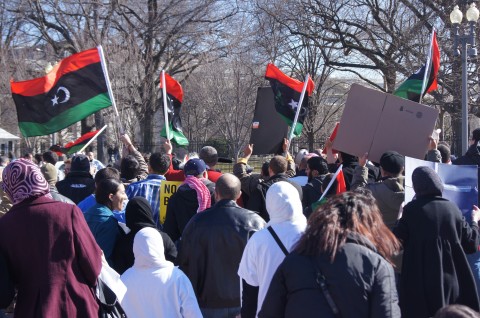
Protesters waving Libyan flags outside the White House in Washington, D.C. Photo courtesy of Wikimedia Commons.
Do you hear the people sing?
Singing a song of angry men?
It is the music of a people
Who will not be slaves again!
When the beating of your heart
Echoes the beating of the drums
There is a life about to start
When tomorrow comes!
Will you join in our crusade?
Who will be strong and stand with me?
Somewhere beyond the barricade
Is there a world you long to see?
Les Miserables
“Do You Hear the People Sing?”
Watching images of ordinary people reclaiming their freedom on the streets of Tunisia while listening to Lisa Gerard’s “Now We Are Free” was a combination so powerful that it moved members of the audience in the Chu Room to tears. At the same time, the fact that her nation had just overthrown an authoritarian regime without foreign support seemed to give sophomore Ikram Lakhdar’s idealism authority over the well-grounded skepticism of senior faculty in the government department. Throughout the room, as well as throughout the world, recent events in the Middle East have invoked a strong emotional mix of inspiration, hope and faith that we have come to associate with revolutions at least since 1789.
To me, these feelings are not foreign at all. My country, Bulgaria, has experienced the euphoria of popular revolts multiple times in the last twenty years. In 1990, one million people gathered on the streets of Sofia to formally sever their ties to communism and express their high hopes for a new democratic future. By the end of 1996, about seven years after the nominal end of communism, the former elites regrouped under a new name and managed to climb back to power. They created a situation of hyperinflation, bankrupting the country and wiping out what little savings Bulgarians had accumulated since 1989. In January 1997, millions took to the streets again and my whole family was among them. I was nine at the time and did not fully understand the complexity of the situation, but I was naively confident in our ability to take down the government and set the country on a path towards a brighter future. During these few days we sang songs, chanted democratic slogans and demanded free and fair elections. By 1998, a new government was in place. Since it was the first one without socialist participation, hopes were extremely high once again.
About thirteen years later, Bulgaria is still quite poor by Western standards, corruption is still common, opportunities for young people still emerge mainly abroad and democratic structures often serve the wealthy elite minority and not the majority of the population. Like every society that has experienced nationwide revolt, Bulgarians have learned the hard way that overthrowing a regime, however well-established, is much easier than building the institutions needed to solve the structural problems that sent people to the streets in the first place. In the Middle East, ousting long-lasting elderly autocrats is just the beginning. The real question is how long it will take the new institutions and leaders to establish a rule of law and adequately address the issues of youth unemployment and fast-rising commodity prices.
Unfortunately, such practical questions are often ignored. The self-affirmation and empowerment of a successful rebellion often result in idealistic assumptions regarding a nation’s immediate ability to solve problems. In 1947, when told by the British that there would be chaos if they left India immediately, Gandhi famously replied, “Yes, but it will be our chaos.” At the time and even now, these words sound extremely powerful, but the Indian people know that navigating the path to prosperity has taken more than half a century and remains an ongoing process today.
Throughout history, transitions after popular uprisings have often proven long and harsh. What followed for eighty years after the French Revolution of 1789—the Reign of Terror, the rise of Napoleon and even a brief reinstatement of the monarchy—did not exactly fit under the idealistic slogan of “Liberté, Egalité, Fraternité.” After Lenin promised private land ownership to Russian peasants in 1917, their high hopes for freedom from feudal agricultural relations were overtaken by a regime that turned out to be equally depriving and even more repressive. In a similar way, the corrupt monarchy in Iran was defeated in 1979, only to give way to a theocratic regime intolerant of dissent, unwilling to protect human rights and unable to realize the economy’s full potential. (If all of these references sound obscure, try remembering the November 4, 2008 improvised celebration on the green inspired by a brilliant orator from Chicago and compare it with his struggle to maintain such enthusiasm in dealing with the pressing issues of the day.)
Being inspired by the idea of democracy and freedom in the Middle East is quite natural and even admirable. What we should keep in mind as observers, however, is that the truly important events in the region are going to be taking place over a much longer time span and will likely no longer be on the front page of the New York Times. •









